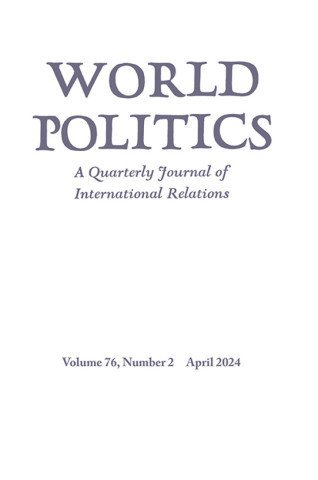The Political Economy of NGO Service Provision
IF 2.5
1区 社会学
Q1 INTERNATIONAL RELATIONS
引用次数: 4
Abstract
Abstract The share of basic services that NGOs deliver has grown dramatically in developing countries due to increased receipt of aid and philanthropy in these countries. Many scholars and practitioners worry that NGOs reduce reliance on government services and, in turn, lower demand for government provision and undermine political engagement. Others argue that NGOs prop-up poorly performing governments that receive undeserved credit for the production, allocation, or welfare effects of NGO services. Using original surveys and a randomized health intervention, implemented in parallel to a similar universal government program, this article investigates the long-term effect of NGO provision on political attitudes and behavior. Access to NGO services increased preferences for NGO, relative to government, provision. However, political engagement and perceptions of government legitimacy were unaffected. Instead, the intervention generated political credit for the incumbent president. This study finds that citizens see NGOs as a resource that powerful government actors control, and they reward actors who they see as responsible for allocation of those resources.非政府组织服务提供的政治经济学
摘要非政府组织提供的基本服务在发展中国家的份额急剧增长,这是由于这些国家获得的援助和慈善事业的增加。许多学者和从业者担心,非政府组织减少了对政府服务的依赖,进而降低了对政府提供服务的需求,破坏了政治参与。其他人则认为,非政府组织支持表现不佳的政府,这些政府因非政府组织服务的生产、分配或福利影响而获得了不应有的信贷。本文采用原始调查和随机健康干预,与类似的普遍政府计划并行实施,调查了非政府组织提供的服务对政治态度和行为的长期影响。与政府相比,获得非政府组织服务增加了对非政府组织的偏好。然而,政治参与和对政府合法性的看法没有受到影响。相反,这次干预为现任总统赢得了政治赞誉。这项研究发现,公民将非政府组织视为强大的政府行为者控制的资源,并奖励他们认为对这些资源分配负责的行为者。
本文章由计算机程序翻译,如有差异,请以英文原文为准。
求助全文
约1分钟内获得全文
求助全文
来源期刊

World Politics
Multiple-
CiteScore
8.40
自引率
0.00%
发文量
24
期刊介绍:
World Politics, founded in 1948, is an internationally renowned quarterly journal of political science published in both print and online versions. Open to contributions by scholars, World Politics invites submission of research articles that make theoretical and empirical contributions to the literature, review articles, and research notes bearing on problems in international relations and comparative politics. The journal does not publish articles on current affairs, policy pieces, or narratives of a journalistic nature. Articles submitted for consideration are unsolicited, except for review articles, which are usually commissioned. Published for the Princeton Institute for International and Regional Affairs
 求助内容:
求助内容: 应助结果提醒方式:
应助结果提醒方式:


